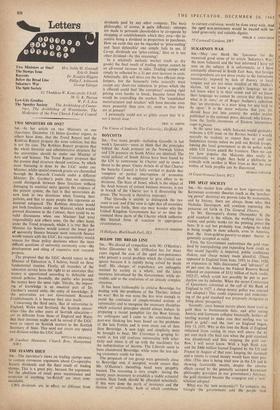THE STAMPS ISSUE
SIR,---The Spectator's views on trading stamps seem to contain erroneous arguments about Co-operative ' Society dividends and the final result of trading stamps. This is a great pity, because the arguments for the abolition of retail price maintenance and suspicion of anything 'un-British' are most, com- mendable.
CWS dividends are, in effect, no different from
dividends paid by any other company. The basic philosophy, of course, is quite different: attempts are made to persuade shareholders to co-operate by shopping at establishments which they own—the in- centive being a dividend in proportion to purchases. How on earth this can be regarded as 'price-cutting' and 'least defensible' one simply fails to see. If Co-op. dividends are 'price-cutting,' then so is any other dividend—by this reasoning!
In a relatively inelastic market (such as dry goods) the final result of trading stamps cannot be an all-round increase in sales. Trading stamps will simply be reflected by a 2+ per cent increase in costs. Admittedly, thi will drive out the less efficient shop- keepers, but the housewife (who naturally must accept any short-run reduction in prices which she is offered) could find 'the conspiracy' causing rigid pricing even harder to break, because fewer firms would be controlling the market. The 'established manufacturers and retailers' will have become even more powerful than •you, sir, seem to fear they are at present! I personally could not so glibly assert that 'it is not a moral issue.
ERIC 0. SMITH.
The Union of Students; The University, Sheffield, 10






























 Previous page
Previous page